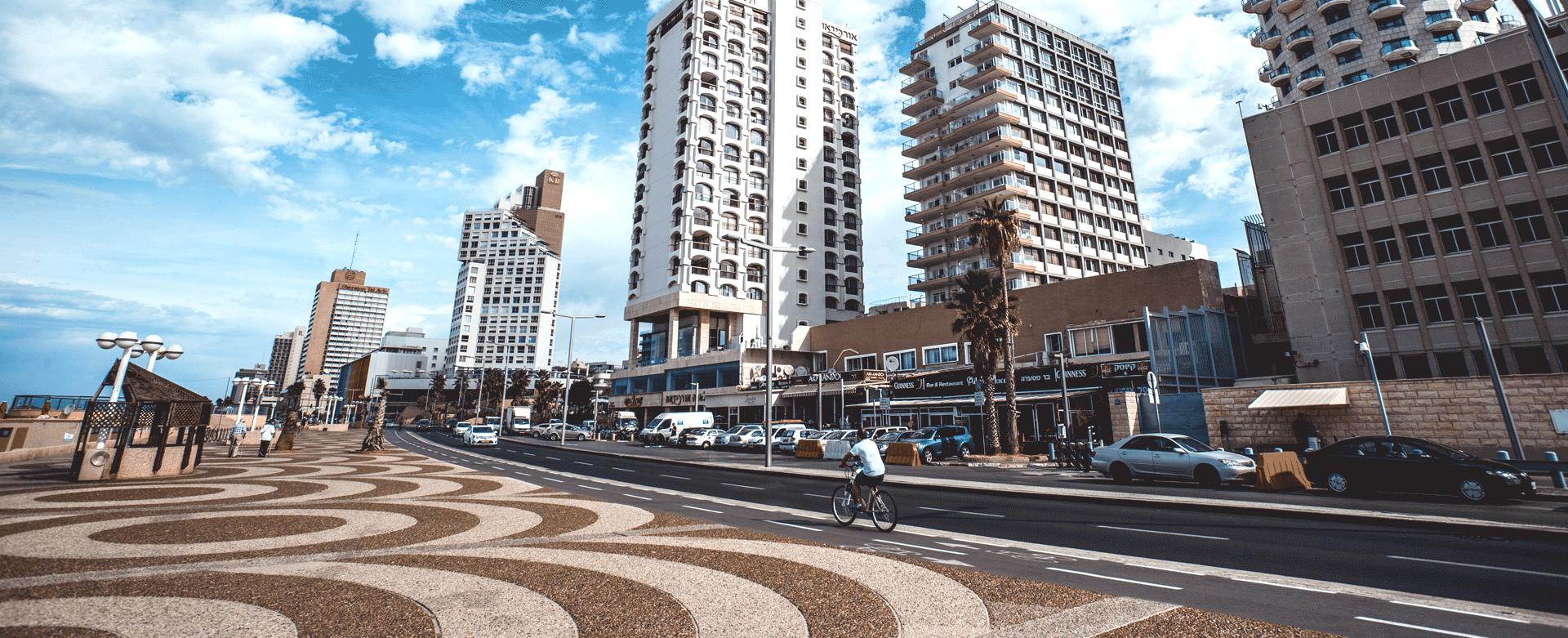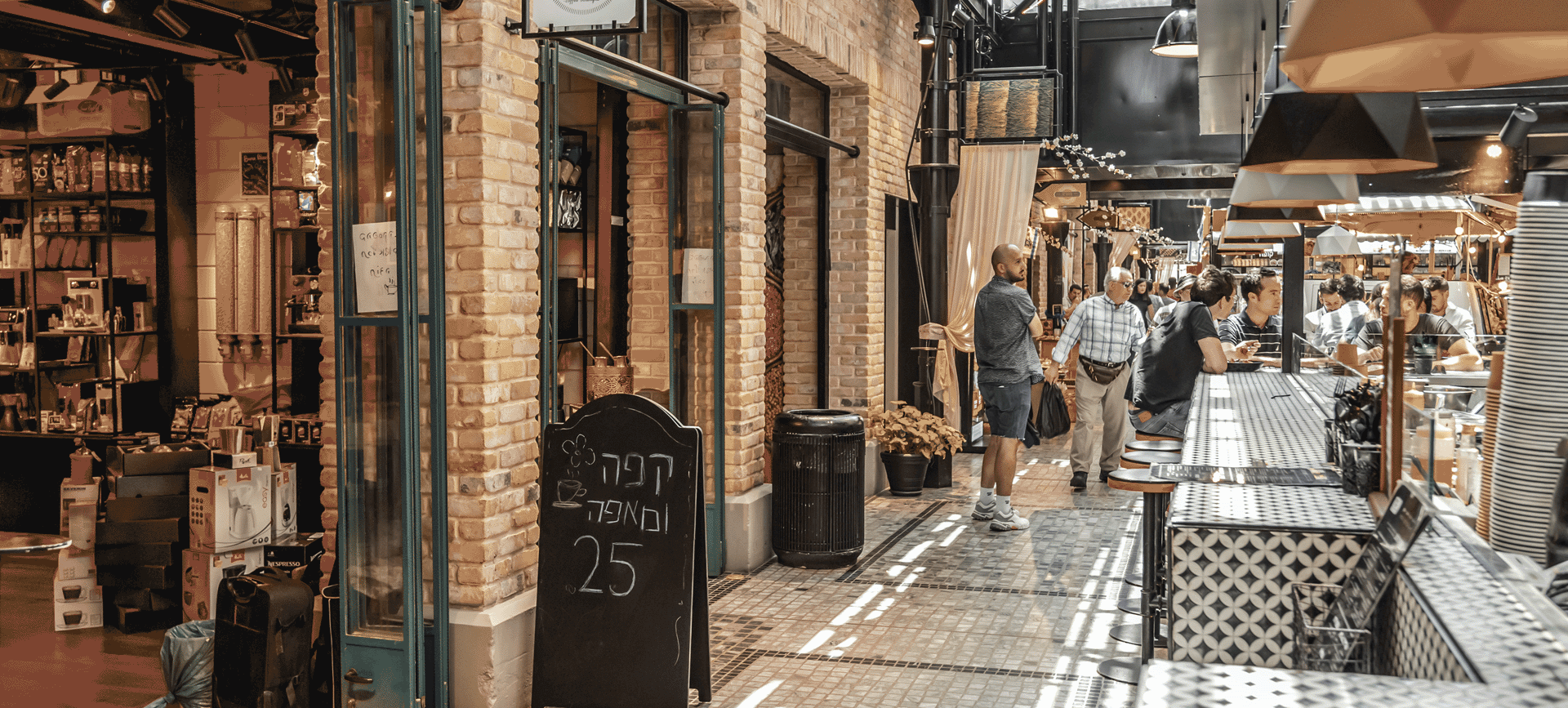5% off for online reservations
Hotel attractions
Dizengoff Street
Dizengoff Street is one of the main and most important streets in Tel Aviv, named after the city’s first Mayor, Meir Dizengoff (1861-1936). The street was previously an important cultural center, that was known as the center of Israel’s bohemia due to the several high fashion stores and cafes, which became a regular spot for prominent cultural figures and intellectuals. As you have probably noticed, Dizengoff is still just as alive and kicking as it was in the past. The street is full of designer fashion stores, packed cafes, vibrant bars and famous sites such as Dizengoff Center, the Fire & Water Fountain at Dizengoff Square, Beit Lessin Theater and more.
Rothschild Blvd
Tel Aviv’s first boulevard, named after Baron Edmond James de Rothschild (1854-1934), an influencing philanthropist and Zionist supporter. Rothschild Blvd is one of the city’s most magnificent and impressive boulevards. It was and still is a vibrant cultural center of Tel Aviv and part of its economic core. Numerous important sites are found along the boulevard, including designer homes of some of the city’s and nation’s leaders, who lived on the boulevard and were preserved over the years, as well as old cultural and economic institutions alongside modern ones. Together with other sites in the city, these historic building comprise the “White City” – a nickname for some of Tel Aviv’s older areas that include more than 4,000 buildings known as part of an international, architectural style declared by UNESCO as a heritage site. Today Rothschild Blvd remains a busy and vibrant boulevard, day and night, with many offices, cafes and restaurants, stores and trendy bars.
The Promenade
The Tel Aviv Promenade is one of the country’s most attractive sites for both locals and tourists and also a preferred choice for many bike riders and people working out along the promenade. There are many restaurants, cafes and bars along the Promenade, a tourism center that offers a combination of magnificent sea views, a breeze all year long and breathtaking sunsets.
Tel Aviv Port
The Tel Aviv Port is the first Hebrew port in the “First Hebrew City”, located in the north-western part of the city. After extensive renovations in 2001, the port became a relaxation and commercial center. Today the Tel Aviv Port is known as one of the city’s most lively leisure area, offering a vibrant night-life, restaurants, cafes, live shows and a shopping complex. A gastronomic food market operates at the port every day, except for Sundays inside Hanger 12 and on Fridays, between 08:00-15:00, there is a farmers market offering fresh, high quality produce.

The Sarona Complex
The Sarona Complex, located near the Azrieli Towers, is becoming one of the city’s busiest and most beautiful leisure, business, culture and shopping centers. The complex is built on the remains of what used to be a Templar colony, the fourth colony that the Templar Germans built in Israel in the second half of the 19th century. The agricultural colony was built based on the classic format of villages in south Germany. Over the past years, the site was carefully renovated and now displays the renovated Templar homes, which were meticulously renovated and are now designer and brand stores, prestigious restaurants and cafes.
Ben Yehuda Street
Ben Yehuda Street is one of Tel Aviv’s main streets, named after Eliezer Ben Yehuda, reviver of the Hebrew language. Together with Allenby Street and as an extension thereof, Ben Yehuda became one of the city’s main streets and central traffic arteries, as well as a busy commercial street. The military parades held in Tel Aviv in the early years of the State of Israel, began on Allenby Street and continued to Ben Yehuda Street until they reached the Maccabiah Stadium. The street’s proximity to the beach and the luxurious hotels along the promenade, have led to a vast concentration of businesses serving tourists in the city, including hostels and travel agencies, as well as restaurants and souvenir stores.
Neve Tzedek
The neighborhood was established in 1887 by Jewish families that wanted to live outside overcrowded Yafo, 22 years before establishing the city of Tel Aviv. In the early 20’s Neve Tzedek was home to authors, artists and famous spiritual leaders, including Noble Prize winner S.Y Agnon and the Chief Rabbi of Tel Aviv, Abraham Kook. The neighborhood, which was established by affluent, Jewish families who immigrated from North Africa, earned the nickname “Small Paris” due to the daring, architectural innovations, which were characteristic to the neighborhood. Today, this picturesque area is home to boutiques, galleries and fashionable cafes and famous for its exciting cultural life. The most prominent site in the neighborhood is the Suzanne Dellal Center, a lively dance and theater complex.

